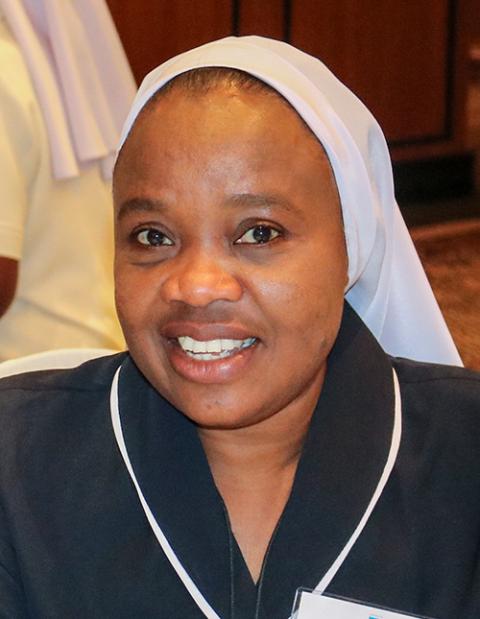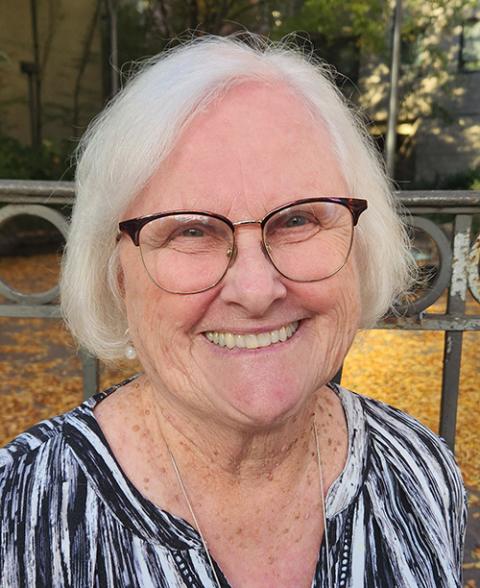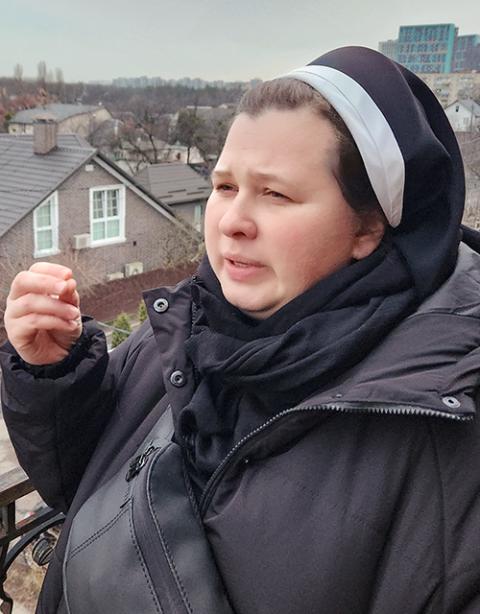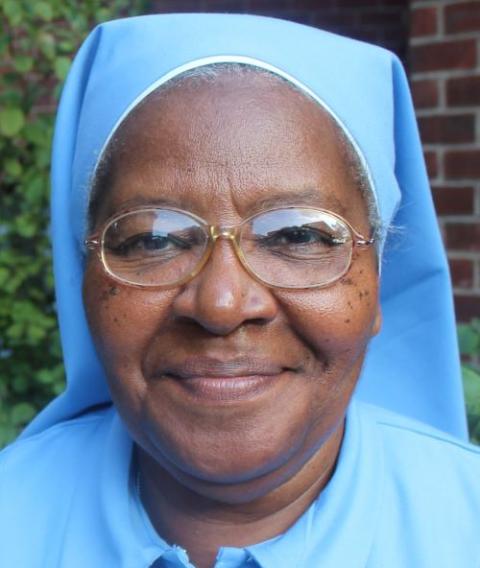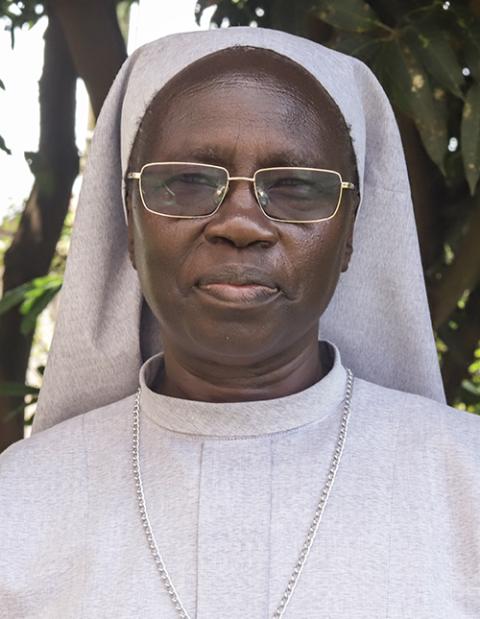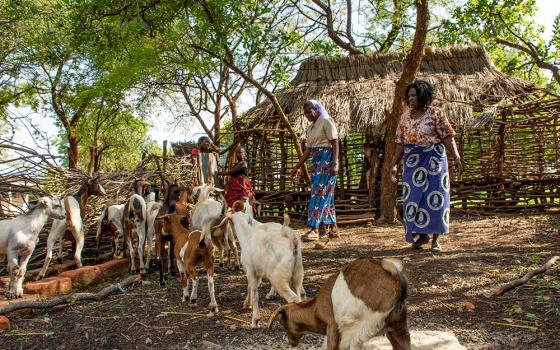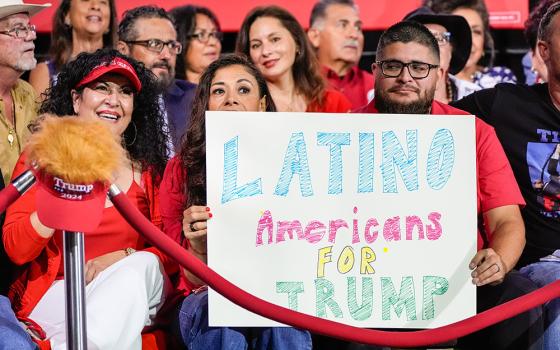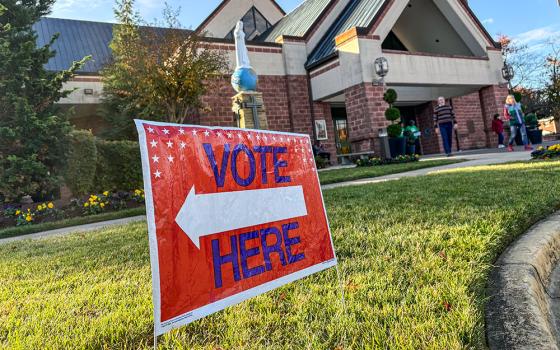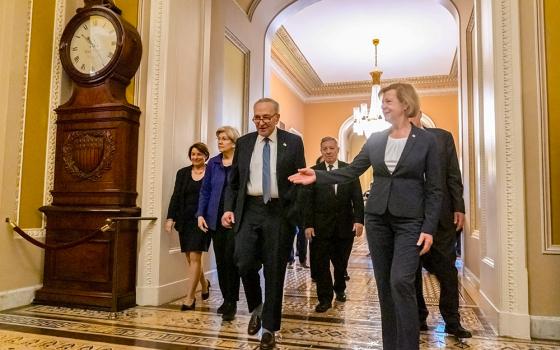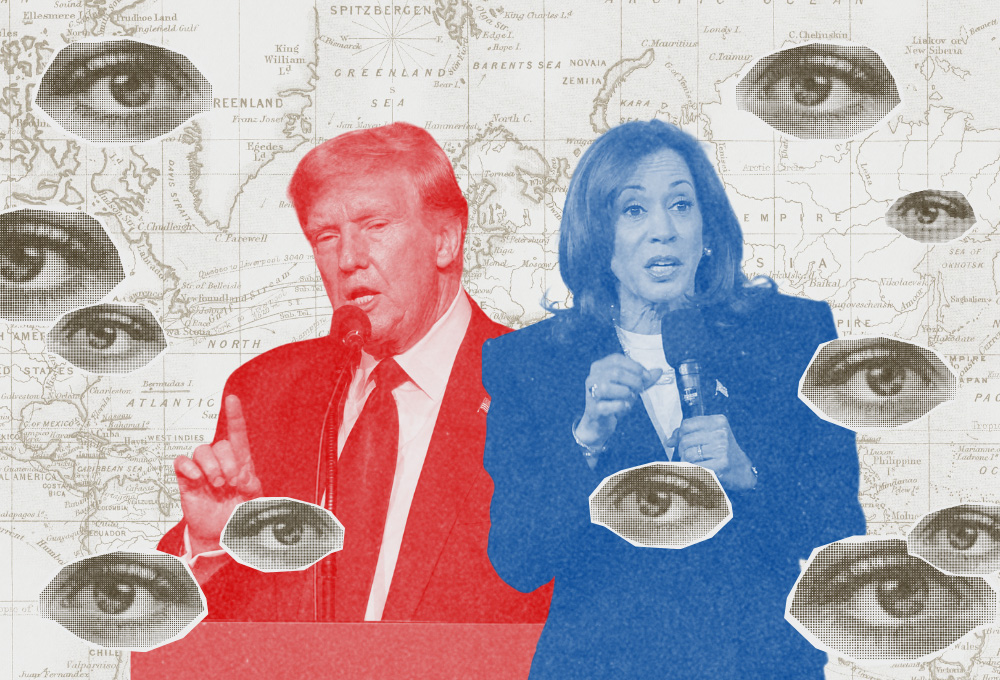
(GSR illustration/Olivia Bardo; Donald Trump photo: OSV News/Reuters/Seth Herald; Kamala Harris photo: OSV News/Reuters/Kevin Mohatt)
Editor's note: On Wednesday, November 6, former President Donald Trump was declared the winner of the 2024 U.S. election.
As the United States approaches the 2024 presidential election, Catholic sisters outside the U.S. say they are watching the race for the White House with a mixture of concern, worry and even anxiety, saying what happens will have deep ramifications throughout the world.
Of particular concern is how the next U.S. president — whether it's Vice President Kamala Harris or former President Donald Trump — will deal with issues like the war in Ukraine, human rights and immigration.
But many, especially sisters dedicated to environmental justice, view the Nov. 5 election as particularly crucial for the global battle against climate change.
An increasing number of sisters, especially in Africa, are expressing concerns about how the next administration will address the environment.
"Africa is one of the regions that suffers the most from climate-related disasters," said Notre Dame de Namur Sr. Eucharia Madueke, who is the women empowerment project coordinator for the Africa Faith and Justice Network.
"We cannot afford to have another administration that does not take this issue seriously; the future of millions of people depends on it," said the sister from Nigeria.
The stakes are high in Africa, where climate change has already resulted in severe droughts, food shortages, disruption of livelihoods, and displacement of communities.
"The consequences of inaction are devastating," said Sr. Maamalifar Poreku, a Missionary Sister of Our Lady of Africa. "We are witnessing firsthand how climate change is destroying livelihoods, and we fear that a return to policies that ignore or even exacerbate this crisis will put millions at risk."
Concerns like that do not surprise one American sister who, at the United Nations, has frequent contact with sisters and others from throughout the world.
"There is absolutely no doubt that this election is the most important election in my lifetime," said Adrian Dominican Sr. Durstyne "Dusty" Farnan, who represents the Dominican Leadership Conference at the global body.
"The world looks to the U.S. to be a compass of justice," Farnan said. "What we do matters. What we say matters. How we say it matters. Who we support matters. What matters to us as Americans matters to the rest of the world."
Many of the sisters interviewed by Global Sisters Report in the leadup to the election prefaced their comments by saying that they are not experts on the sometimes baffling intricacies of U.S. politics.
However, those concerned with social justice ministries said that Harris is more likely to champion the causes they think are important.
"When it comes to Kamala Harris, from what I understood during the presidential debate, it seems like climate change will be a priority for her," Poreku said. "If Kamala Harris keeps her word and wins, engaging in climate solutions might have a chance."
Poreku said she is concerned that if Trump wins the election, his new administration may have a negative impact on the climate change crisis, especially for Africa and the global south. "These regions are already heavily affected by the effects of climate change, despite contributing less to it."
Poreku and a number of sisters said those concerns are also amplified by Trump's perceived racist attitudes toward developing countries, pointing to past comments of his that she said "demonstrates his disdain for Africa."
"If he wins the election, it is evident that his priorities lie with the wealthy rather than with the vulnerable continents, people and the planet," Poreku said.
In Ukraine, real worries about the future
Ukrainian sisters said that Trump's criticism of NATO, perceived closeness to Russian President Vladimir Putin, and lukewarm support for the Ukrainian government in the face of a full-scale invasion by neighboring Russia are deeply troubling.
"People in Ukraine are very much concerned about the election, And they have more concerns about Trump than the other candidate," said Sr. Anna Andrusiv, whose ministry as a sister of the Order of St. Basil the Great is based in the Ukrainian capital of Kyiv.
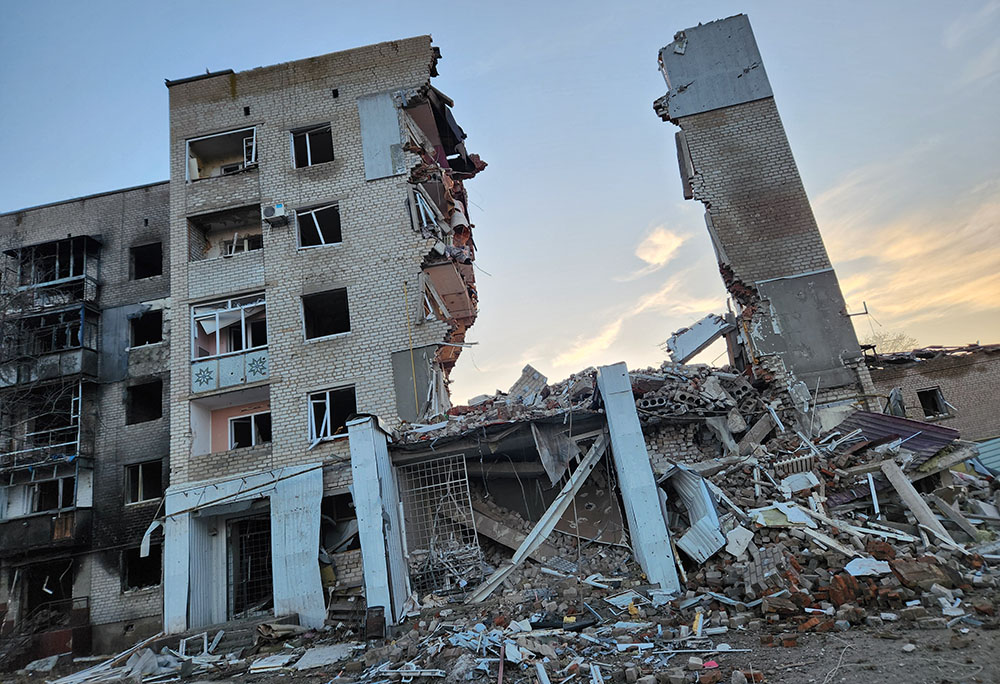
The effects of the full-scale invasion by Russia into Ukraine are evident in this February 2024 photo of a destroyed building near the village of Preobrazhenka, in southeastern Ukraine. Ukrainian Catholic sisters say they, like other Ukrainians, are worried about the possible implications of the U.S. presidential election for their country. (GSR photo/Chris Herlinger)
She noted, for example, Trump's refusal to declare whether he supports a Ukrainian victory against Russia.
A second Trump term, Andrusiv said, could "have a great impact on the fight in Ukraine."
"We are a small country and our nation still needs help from big, independent and strong countries," such as the U.S. and its allies in Europe. Still, Andrusiv added, "we have hope."
Two Ukrainian sisters who did not want to be quoted by name because of security concerns echoed Andrusiv's worries.
One sister said, "People in Ukraine, more than ever, are very worried about the elections in the U.S. because to a large extent the course of the war in Ukraine depends on the policy of the American leadership."
"Ukrainians are worried about a candidate who is not ready to support Ukraine in the war against Russia," she said, adding, "The election in the U.S. will affect the ability to resist violence from Russia. America now has the most influence over the course of political processes in the world.
"So if the next president will be open to helping Ukraine, then we have great hope that we can eventually force Russia to leave our territories and leave us in peace."
The sister said, "If Russia is not stopped now, it will never stop and will continue to conquer and destroy life and the world around it with its imperial encroachments."
Another sister said she and fellow Ukrainian sisters "are awaiting the elections with intense interest and, yes, one of the candidates scares us a lot."
The U.S. presidential race, she said, seems "like a battle between a candidate with certain values and a candidate without any values."
In Haiti, worries about security — and racism
The issue of values also concerns sisters ministering in Haiti, who are also bothered by perceived racist comments expressed by Trump and some of his supporters.
Sr. Denise Desil, the mother general of Haiti's Little Sisters of St. Thérèse of the Child Jesus, said Haitians have not taken well to Trump's past derogatory comments about Haiti and his recent unfounded comments about Haitian immigrants in an Ohio community killing and eating domestic pets.
Desil said that Haitians in the U.S. are hard-working residents who are trying to improve their lives and the lives of their families and in the process contribute to American culture and the American economy.
"Why would a government want to send people back?" she said of Trump's expressed aim of mass deportations of undocumented immigrants.
Desil said she, fellow sisters and fellow Haitians are dealing daily with a deteriorating humanitarian and security situation in Haiti and wonder what the U.S. might do to help improve the conditions.
She noted that a situation in which gangs control much of the urban areas of Haiti remains dire: "It's always bad."
How the outcome of the U.S. election would affect Haiti is far from clear, said Desil and another sister, Sister Paésie, a native of France and Sister of Charity whose ministry is now done as a member of the Kizito Family mission.
Sister Paésie told GSR in an email that "what is foremost is a hope that there would be a more coherent policy on [U.S.] weapons flowing to Haiti" — an issue of increasing concern to American sisters involved in Haiti-related advocacy work.
Haitian interest in the election, she said, "is not so much who is elected but what will happen after the election."
Promises kept or abandoned?
What happens after the election is also of great concern to the sisters in Africa, with Poreku expressing serious doubts about whether Harris, if elected, would follow through on any promises for climate justice after winning the elections.
"One fear I have is that politicians say one thing during campaigns to get votes, and once they are elected, they do another thing. Will Kamala Harris be different from other politicians?" she said.
Increasingly, African sisters are realizing that the primary victims of climate change are the very people they are dedicated to serving — the poorest of the poor.
For these sisters, climate change is not merely a political issue; it is a moral imperative. They argue that the U.S., as one of the world's largest polluters, has a responsibility to take the lead in addressing the global crisis.
This is especially crucial given the disproportionate impact on impoverished nations that contribute the least to carbon emissions, they say: Though Africa only contributes 2-3% of pollution, it experiences most of its adverse effects, noted Sr. Mary Lilly Driciru, a member of the Missionary Sisters of Mary Mother of the Church from Uganda.
"Therefore, let the next U.S. government be mindful of Africa's plight," she said. "Remember, the negative energy exerted comes back around and affects the one who exerted it."
The African sisters hope that the next U.S. president will ensure African nations receive the crucial support they need to combat the devastating effects of climate change.
"The future of our planet, and especially the lives of those most vulnerable, depends on it," Poreku said.
Touching the life of Latin America
The influence the U.S. exerts in the world is keenly felt in Latin America.
"Everything that touches the U.S, touches the life of the continent as well," said Sr. Daniela Cannavina, secretary-general of the Latin American and Caribbean Confederation of Religious.
The most obvious way is because of the vulnerable populations that migrate north from Latin America. However, as an organization "it is not a topic that we have discussed at this precise moment," said Cannavina, a Capuchin Sister of Mother Rubatto from Argentina.
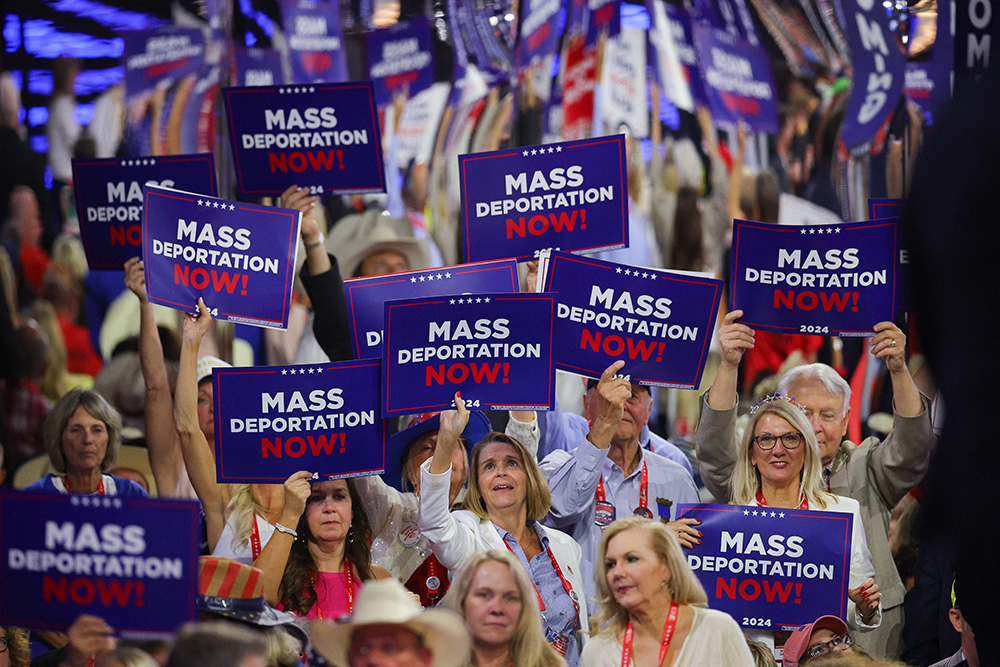
Delegates hold "Mass deportation now!" signs on Day 3 of the Republican National Convention at the Fiserv Forum in Milwaukee July 17, 2024. (OSV News photo/Reuters/Brian Snyder)
Sr. Maria de los Dolores Palencia Gómez, of the Sisters of St. Joseph of Lyon in Mexico, told GSR that both parties have shown lately similar policies toward immigration, although some "at times disguised as less aggressive."
It is hard to tell Harris' stance, however, because it has largely been driven by President Joe Biden, she said.
Beyond immigration, Mexico's economy is also profoundly affected by what happens in elections in the north, depending on approaches to trade and tariffs, she said. "We are necessarily dependent on much stronger and much larger economies."
Consuelo Vélez, a Colombian theologian based in the capital of Bogotá, said, "Donald Trump certainly is not good for us in the region, but Biden has not been good for us either. ... As the richest country in the world, its goal is to protect its own hegemony," she said.
It is difficult to predict what a Harris presidency might mean for Latin America. But in the end, Vélez said that Harris seems like the less detrimental of two options that Latin America will have to contend with.
At the church level, Vélez worries how even some Latino Catholics in the U.S. have veered from supporting migrants and instead are "blindly" supporting candidates who manipulate God and religion.
"There's a confusion there," she said.
Hopes for a peace-oriented US president
In India, sisters have expressed their concerns about ongoing wars in various parts of the world and wide human rights violations across the globe.
"The presidential election in America does matter to India and other nations as the U.S. has always played a prominent role in every aspect of human life across the globe," said Medical Mission Sr. Joan Chunkapura.
Advertisement
Analyzing the foreign policy indicators of both Harris and Trump, Chunkapura said Harris has fared better than Trump in "areas such as climate change, defense, global health, relationship to other countries, immigration, [artificial intelligence] and technology."
And with regard to foreign policy, Chunkapara prefers Harris to Trump, "who speaks for only America." She also believes that America's weapon traders are influencing the election process as well as U.S. foreign policies, which are "reflected in the ongoing conflicts in Russia, Ukraine, Israel, Palestine, Iran and so on."
Holy Spirit Sr. Tessy Jacob, the vice president of the Indian Catholic Press Association, said Harris' Indian roots do not matter in an American president. Rather, "what is important is that the elected candidate works for peace in the world amidst war and conflicts," she said.
Similarly, Sr. Rose Paite, an anti-trafficking human rights activist and member of the Missionary Sisters of Mary Help of Christians, also said it does not matter for her who comes to power in America.
"Whether Donald Trump or Kamala Harris, what matters is their ability to help restore peace and justice in the world."
GSR freelancer Thomas Scaria contributed to this report.



